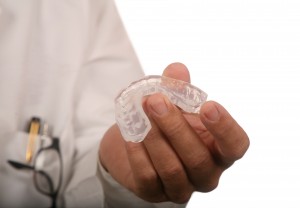 Bruxism is another name for a problem you may be dealing with everyday without knowing it—teeth grinding. More specifically, bruxism can involve grinding your teeth back and forth across each other, or just clenching your jaw.
Bruxism is another name for a problem you may be dealing with everyday without knowing it—teeth grinding. More specifically, bruxism can involve grinding your teeth back and forth across each other, or just clenching your jaw.
Often, what prompts this is stress. It’s almost like a natural reaction and is something you can do unconsciously without thinking about too much.
That’s especially the case when you sleep. Patients who have trouble with bruxism often have the greatest trouble at night, when it’s impossible to consciously stop the grinding or clenching.
How Can I Know If I Have Bruxism?
Only a diagnosis from a dentist like Dr. Carmen can tell you for sure, but some symptoms to watch out for include:
- Jaw pain
- Headaches
- Neck, back, and shoulder pain
- Earaches
- Sensitive teeth
- Depression
- Eating disorders
- Insomnia
With a thorough oral exam from Dr. Carmen at our Norman dental office, we can help you identify whether or not your painful symptoms are being caused by bruxism.
Why Is It Important To Treat Bruxism?
Treating bruxism is important because, if left untreated, it can lead to TMJ dysfunction. Both have painful symptoms and can significantly damage your teeth.
If you want to save your smile from serious damage and find a way to alleviate your painful symptoms, call our Norman office to schedule an appointment with Dr. Carmen. Our dental office serves patients from Norman, Moore, the University of Oklahoma, Central Oklahoma, and surrounding areas.

 You’ve probably heard of TMJ, but do you know what it is? Many believe TMJ is a painful condition that involves jaw clicking or jaw pain. And while that’s not far from the mark, TMJ actually stands for nothing more innocuous than temporomandibular joint, which is the joint connecting both sides of your jaw to the bottom of your skull.
You’ve probably heard of TMJ, but do you know what it is? Many believe TMJ is a painful condition that involves jaw clicking or jaw pain. And while that’s not far from the mark, TMJ actually stands for nothing more innocuous than temporomandibular joint, which is the joint connecting both sides of your jaw to the bottom of your skull.